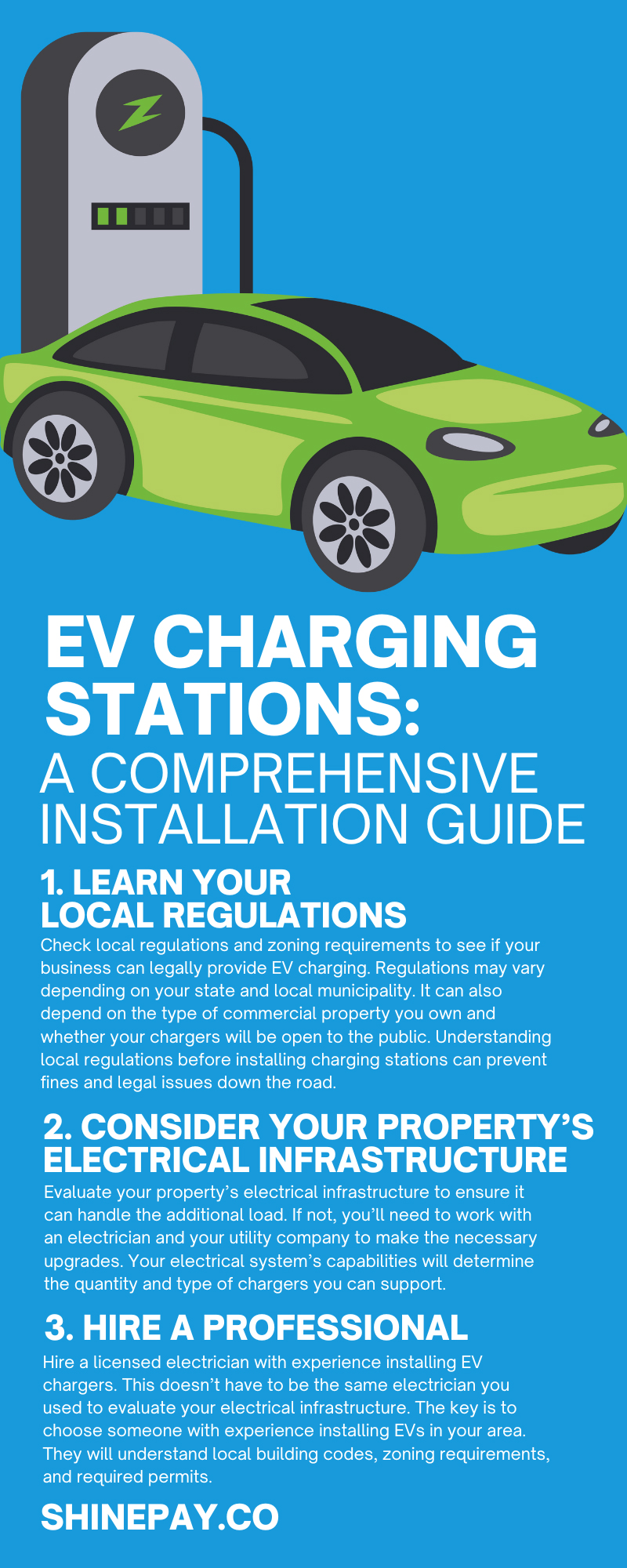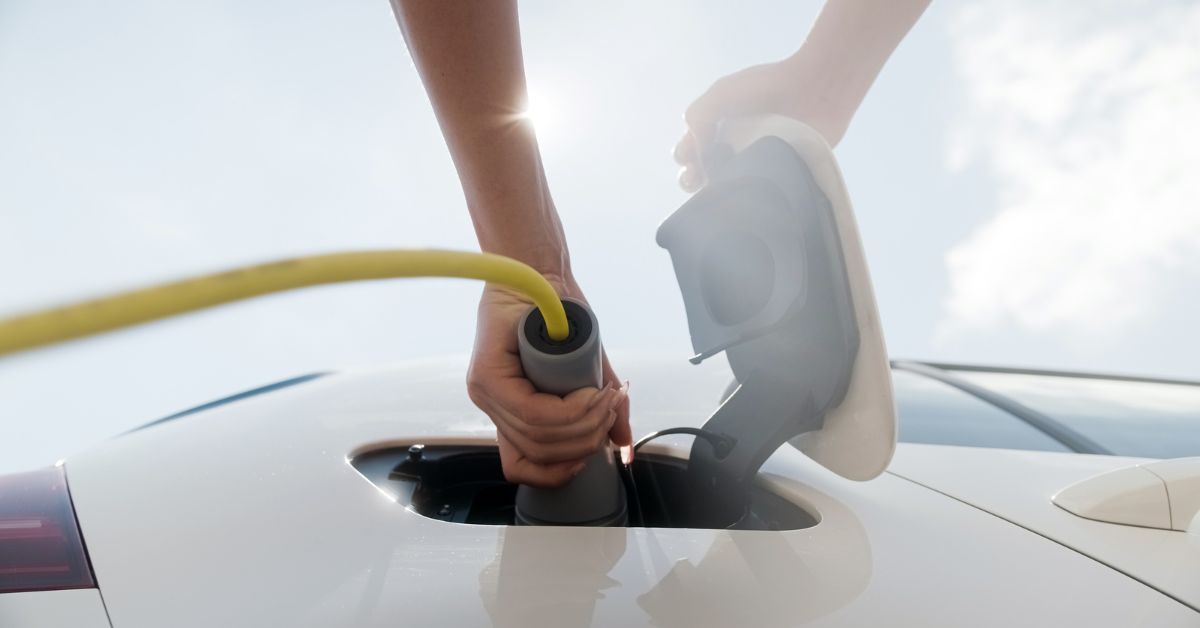The rise of electric vehicles (EVs) is not just a trend—it’s a movement redefining how we think about transportation. For business owners, installing EV charging stations is quickly becoming a smart investment that attracts eco-conscious customers and employees.
This comprehensive installation guide will walk you through everything you need to know about setting up EV charging stations at your business. From understanding the different types to evaluating your needs and planning the installation, we've got you covered.
Understanding the Basics of EV Charging Stations
There are a few types of EV charging stations to consider. Each offers different charging speeds, costs, and technical specifications, making it essential to choose wisely based on your business needs.
Level 1 Charging
Level 1 charging is the most straightforward and cost-effective option. It typically charges an electric vehicle for eight hours or overnight, making it ideal for homes.
For businesses, Level 1 chargers are only useful when the EV stays parked for long durations. This option might appeal to businesses looking for an affordable starting point in providing EV charging solutions.
Level 2 Charging
Level 2 charging strikes a balance between speed and cost. It takes about four hours to charge an EV and is perfect for places where vehicles stay parked for extended periods, such as hotels, hospitals, and museums. Many businesses opt for Level 2 chargers because they cater to both employees and customers who might spend a few hours on the premises.
DC Fast Charging
DC fast charging is the powerhouse of EV chargers. It can reach an impressive 80 percent charge in less than an hour, making it the fastest and most expensive to install. Retail stores, grocery chains, and restaurants often prefer DC fast charging to attract EV drivers looking to power up quickly while shopping or dining.
Assessing Your Business’s Needs
Before jumping into the installation process, it’s crucial to assess the demand for EV charging stations in your area. Start by evaluating the number of potential users. Are your customers or employees already asking for charging facilities? Understanding the demand will help determine how many stations you should install.
Location is another critical factor. You should place charging stations in easily accessible areas for convenience. Also, consider the compatibility of charging stations with various electric vehicles so they cater to a broad range of users.
Planning and Preparation
Planning can save time and money. These are the key steps you need to complete before proceeding with installation.
1. Learn Your Local Regulations
Check local regulations and zoning requirementsto see if your business can legally provide EV charging. Regulations may vary depending on your state and local municipality. It can also depend on the type of commercial property you own and whether your chargers will be open to the public. Understanding local regulations before installing charging stations can prevent fines and legal issues down the road.
2. Consider Your Property’s Electrical Infrastructure
Evaluate your property’s electrical infrastructure to ensure it can handle the additional load. If not, you’ll need to work with an electrician and your utility company to make the necessary upgrades. Your electrical system’s capabilities will determine the quantity and type of chargers you can support.
3. Hire a Professional
Hire a licensed electricianwith experience installing EV chargers.This doesn’t have to be the same electrician you used to evaluate your electrical infrastructure. The key is to choose someone with experience installing EVs in your area. They will understand local building codes, zoning requirements, and required permits.
4. Complete the Paperwork
Obtain permits and submit installation plansto the local regulatory authority. Your electrician will likely handle this step for you. That said, it’s wise to discuss this step as your business will need to comply with local laws. These permits ensure your charging stations meet all regulatory standards, paving the way for a smooth installation process.
5. Choose the Right Equipment
Choosing the right equipment for your EV station is the final step. Research reliable suppliers who offer quality products and excellent customer support. A good supplier will guide you in selecting equipment that meets your needs. Your electrician can also provide guidance for this step in the process.
Installing Commercial EV Charging Stations
After you have completed the planning steps, it’s time to move forward to installation. A licensed electrician must be the one to install your EV charging stations. They will mount the stations correctly according to local building codes and the manufacturer’s guidelines. Since your electrician will have already managed the permit process, they’ll ensure compliance with local regulations.
Installation isn’t complete without testing the system. Safety is critical in electrical systems, so your electrician will ensure all procedures adhere to safety standards. Keep in mind that if your charging station is publicly accessible, it will also require a final inspection from your local jurisdiction to ensure it meets building codes.
Operating and Maintaining Your Commercial EV Charging Station
Once installed, the focus shifts to operation and maintenance. Regular inspections are necessary to keep stations safe and functional. Implement a maintenance schedule to check the EV station’s condition periodically. Additionally, make sure to carry liability insurance to protect your business from any unforeseen incidents and legal issues.
It’s also important to decide on operational details such as payment. Some businesses offer free charging to their employees or customers as a perk, while others integrate payment systems for public charging. If your goal is to profit from your commercial EV charging stations, you’ll need to integrate a payment system.
Easy-to-use payment interfaces with clear instructions for first-time users will create a positive user experience. Streamlining this process will provide your EV station visitors with hassle-free charging, and you get the benefit of additional revenue. It’s a win-win!
The Future of EV Charging Stations for Businesses
Electric vehicle technology is evolving rapidly, and businesses must future-proof their charging infrastructure. Consider integrating smart charging solutions that can adapt to future needs. Stay informed about advancements in EV technology to keep your business at the forefront of the industry.
By investing in charging stations, businesses can demonstrate their commitment to sustainability and innovation. Staying ahead of trends not only benefits the environment but also improves your brand’s reputation. Installing EV charging stations is a strategic move for businesses aiming to attract a growing demographic of eco-conscious consumers and employees.
In this comprehensive installation guide, we’ve explored the different types of EV charging stations, explained how to assess your business needs, and outlined the planning and installation processes. By operating and maintaining charging stations effectively, businesses can reap long-term benefits.

